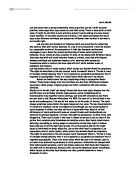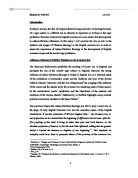Despite the implementation of legislation both on the international and national level the precise legal definition of PPP remains elusive. Before any treaty provisions were in place the European Court of Justice (ECJ) had shown ingenuity in expanding the EU’s competence in the environmental arena, however there has been little to no discussion as to the scope of PPP since. R v. Secretary of State for the Environment Ex parte Standley is one of the few cases in which PPP has been referred to the ECJ.
The case first appeared in the UK Courts before it was referred to the ECJ. The issue of this case was the extent of the duty under the Nitrates Directive; two farmers had sought to challenge the Secretary of State’s implantation of the Directive and brought forward an application of judicial review. The farmers argued that the Government had failed to apply PPP as they were unable to prove that the nitrate pollution in those areas were solely caused by agricultural operations; the result of this was that the farmers would have to bear the cost of removing the nitrates, even though it was not all due to them.
The case was referred to the ECJ who held that the Directive did not infringe PPP, but it did not require the farmers to bear the full costs. The Court stated that the principle of proportionality was invoked and that this principle was reflected in PPP.
As already mentioned the discussion of PPP at EU level as been limited, this is true also to UK law, where there has been few cases before the UK courts where PPP has been considered in any great detail, the case law that does exist is both diverse and broad in its scope, covering areas of law that would not necessarily be linked to environmental law as can be seen in cases where PPP has been raised when discussing insolvency of companies.
In Re Mineral Resources ltd Neuberger J acknowledged the conflict between the Environmental Protection Act 1990 (EPA) and the Insolvency Act 1986 (IA). Neuberger stated that the EPA should prevail over the IA and raised PPP; declaring that there was a public interest in the maintenance of a healthy environment and PPP and that it is ‘the view that prevails both in the popular perception and in the legislative system in this country and indeed, in most of the developed world’In his final statement Neuberger reflects on the emphasis of the principle in EU law stating that the protection of the environment should prevail over the winding up of companies.
It appears clear from Neuberger’s judgement that PPP is to have elevated status in these circumstance and also that the High Court was suggesting that the principle was well established in both domestic and EU law, however in Re Bluestone Chemicals Ltd (in liquidation) the Court of Appeal held that there was not inconsistency between the EPA and the IA. Morritt LJ noted that the Directive did not go into detail as to the consequences if the polluter was insolvent. The Court of Appeal reverted back to earlier principles that legislation must be explicit, this case has caused concern with the Environmental Agency who are now pressing the Government for legislative change.
As is clearly evident the court’s themselves cannot agree on the application of PPP, this may be due to the vagueness in the legal definition of the principle. This is just one difficulty arsing and this needs to be discussed as well as the issues of environmental justice that have arisen.
Internationally there is no agreed definition of PPP nor is the scope of its application precisely defined, this is mainly due to the fact that the principle reflects different meanings, tailored to different contexts in different jurisdictions, this is what has been criticised as political misinterpretation; however it has to be noted that this itself has caused disapproval as it ignores the complexity of environmental damage and the developmental stage of individual nations.
It has been identified that PPP has several different meanings, Bugge’s has identified four versions that have been expressed in different jurisdictions, these being, the principle as an economic principle, as a legal principle, as one of international harmonization and as a principle of allocation of costs between states. These identifications may be used as a way of cataloguing the variants in different jurisdiction instead of a criticism of the principle itself. In fact it has been argued that the fluidity of the principle is in fact its strength, particularly with the continuing evolution in the scope and definition of the principle.
As it stands PPP is reliant of the different interpretation, this it self has caused general problems leading to issues of environmental justice. Multiple issues have been identified; however most if not all seem to stem from issues surrounding the identification of the polluter. The UK courts have made some attempts to overcome this issue; in the National Grid Gas Plc Case Forbes J held that a successor of a polluter was to be treated the same way as the polluter even though they were not directly responsible.
Despite the discrepancies between PPP and environmental justice, there is some common ground; this common ground exists merely due to the fact that PPP is applied as a principle of liability. Environmental justice campaigners called for a more equitable distribution of the burdens caused by pollution, to some extent PPP reflects these demands; evidence for this is most striking in cases where the costs bared by the polluter are taken to incorporate not only the cost of pollution prevention but social costs as well.
To conclude despite there being no international agreed definition of PPP, and the issues arising from ‘political misinterpretation’ mean that the full understanding of the principle is hindered and in turn the effective implementation. However, as stated case law on PPP is limited both in number and scope, if this were to be rectified it is possible that issues arising from definitional and implementation problems may also be remedied. Whilst this is being done, it must be born in mind that the fluidity of the principle is considered to be right, nevertheless it is important that Supra-National organisations such as the EU operate on the same definitions, it cannot be deemed fair for polluters to pay more in one country for the same level of harm that has been caused in another.
Pederson O.W Environmental Principles and Environmental Justice
De Lucia, V. Polluter pays principle
Mann, I A comparative study of the polluter pays principle and its international normative effect on pollutive processes
The Dialogues of Plato: The Laws, vol. 4, book 8, section 485(e), translated by Jowett B, Oxford: Clarendon Press (4th Edition), 1953
Organisation for Economic Co-operation and Development Council on Guiding Principles
OECD, 1972. Recommendation of the Council on Guiding Principles concerning international economic aspect of environmental policies. May. Council Document no. C(72)128 Paris: Organisation for Economic Co-operation and Development
OECD, 1989. Recommendation of the Council on concerning the application of the polluter-pays principle to accidental pollution C(89) 88 Paris: Organisation for the Economic Co-operation and Development
http://www.defra.gov.uk/environment/policy/liability/pdf/faq.pdf
Mouton, A. Norton C.J. Extending the 'polluter pays' principle: environmental damage regulations
Mann, I A comparative study of the polluter pays principle and its international normative effect on pollutive processes
Sadeleer, N De. Environmental Principles: From Political Slogans To Legal Rules (2002)
Gordon R. Using EC law in Environmental Judicial Review
R v Secretary of State for the Environment and another, ex parte Standley and others (National Farmers' Union intervening) (Case C-293/97) - [1999] All ER (D) 453
R. v Secretary of State for the Environment and Another ex parte H.A. Standley and Others and
D.G.D. Metson and Others, Queens Bench Division (Crown Office List), CO/2057/96.
Council Directive 91/676/EEC
Macrory, R. Havercroft, I. principles into practice - united kingdom paper
Re: Mineral Resources Ltd, Environment Agency v. Stout [1999] 1 All ER 746
Judgement of Neuberger J, 30th April 1998.
Official Receiver (as liquidator of Celtic Extraction Ltd and Bluestone Chemicals Ltd) v.
Environment Agency [1999] 2 BCLC 555.
Judgement of Morritt LJ, para. 39, 14th July 1999.
Macrory, R. Havercroft, I
Mcloughlin, J.B & Bellinger, E.G. Environmental Pollution Control 145 (1993).
Hans Chr. Bugge, The Principles of "Polluter Pays" in Economics and Law, in Law And Econ. Of The Environment 53, 54 (Erling Eide & Roger van den Bergh eds., 1996)
Mann, I A comparative study of the polluter pays principle and its international normative effect on pollutive processes
Hans Chr. Bugge, The Principles of "Polluter Pays" in Economics and Law, in LAW AND ECON. OF THE ENV'T 53, 54 (Erling Eide & Roger van den Bergh eds., 1996).
Mann, I A comparative study of the polluter pays principle and its international normative effect on pollutive processes
Ibid See also Alan E. Boyle, Economic Growth and Protection of the Environment: The Impact of International Law and Policy, in Environmental Regulation and Economic Growth 173, 180 (Alan E. Boyle Ed., 1994).
Pederson O.W Environmental Principles and Environmental Justice
R (on the application of National Grid Gas plc (formerly Transco plc)) v. Environment Agency 2006 EWHC 1083
Paragraph 31 of Forbes J Judgement
Pederson O.W Environmental Principles and Environmental Justice







